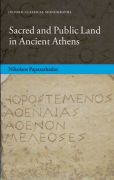
This book examines the ways by which the city-state of Athens, and its various associations, administrative and religious, managed their landed assets. Itinvestigates the close connection between income and sacred property and it analyses notions of sacred and public ownership in antiquity by deconstructing earlier anachronistic interpretations. Landed wealth was crucial for the economies of all Greek city-states and, despite its peculiarities, Athens was no exception in that respect. This monograph is the first exhaustive treatment of sacred and public - in other words the non-private - real property in Athens. Following a survey of modern scholarship on the topic, Papazarkadas scrutinizesliterary, epigraphic, and archaeological evidence in order to examine lands and other types of realty administered by the polis ofAthens and its constitutional and semi-official subdivisions (such as tribes,demes, and religious associations). Contrary to earlier anachronistic modelswhich saw sacred realty as a thinly disguised form of state property, the author perceives the sanctity of temene (sacred landholdings) asmeaningful, both conceptually and economically. In particular, he detects a seamless link between sacred rentals and cultic activity. This link is markedlyvisible in two distinctive cases: the border area known as Sacred Orgas, a constant source of contention between Athens and Megara; and the moriai, Athena's sacred olive-trees, whose crop was the coveted prize of the Panathenaic games. Both topics are treated in separate appendices as are several other problems, not least the socio-economicprofile of those involved in the leasing of sacred property, emerging from a detailed prosopographical analysis. However, certain non-private landholdings were secular and alienable, and their exploitation was often based on financial schemes different from those applied in the case of temene. Thisgives the author the opportunity to analyze and elucidate ancient notions of public and sacred ownership. INDICE: 1. Introduction: Modern scholarly responses 2. The Athenian polis as administrator of sacred realty A preliminary note The landed wealth of Athena Polias and the Other Gods The sacred property of the Eleusinian Goddesses: administrative aspects The new polis-gods as proprietors of realty Athenaion Politeia 47.4-5 and the leasing of sacred lands in Classical Athens Investing sacred rentals The economic significance of sacred rentals 3. The constitutional subunits of Athens as administrators of realty The landed assets of the Attic tribes The early phase The Athenian reacquisition of Oropos and the tribal land allotment Administration of phyle-properties and tribal economics The realproperty of the Attic demes Prolegomenon The mechanism of leasing Other formsof deme property administration Sales of lands controlled by demes Rentals, deme economics, and religion Non-sacral deme property Lessees and purchasers ofdeme properties The territorial aspect of the Attic demes Epilogue 4. The non-constitutional associations of Athens as administrators of realty The real property of the Attic phratries Types of phratric realty Exploitation of phratric realty The Attic gene and their landed property Introductory remark The landed wealth of the Salaminioi: a case-study Gentilician property: beyond the Salaminioi An overview The real property of the Attic orgeones Leasing out orgeonic property Sales of orgeonic property and the problem of alienation Lessees and purchasers of orgeonic property: some considerations Other types of associations as property administrators 5. Public, non-sacred, realty in ancient Athens The evidence An interpretative analysis 6. Conspectus Appendices The SacredOrgas Moriai: Sacred arboriculture in Classical Athens IG II2 1593 revisited The Theodoreion of the Prasieis The genos of the Pyrrhakidai The split of the Salaminioi and the eponymous archon Phanomachos Catalogueof lessees and guarantors of polis-controlled temene Bibliography
- ISBN: 978-0-19-969400-6
- Editorial: Oxford University
- Encuadernacion: Cartoné
- Páginas: 416
- Fecha Publicación: 13/10/2011
- Nº Volúmenes: 1
- Idioma: Inglés
